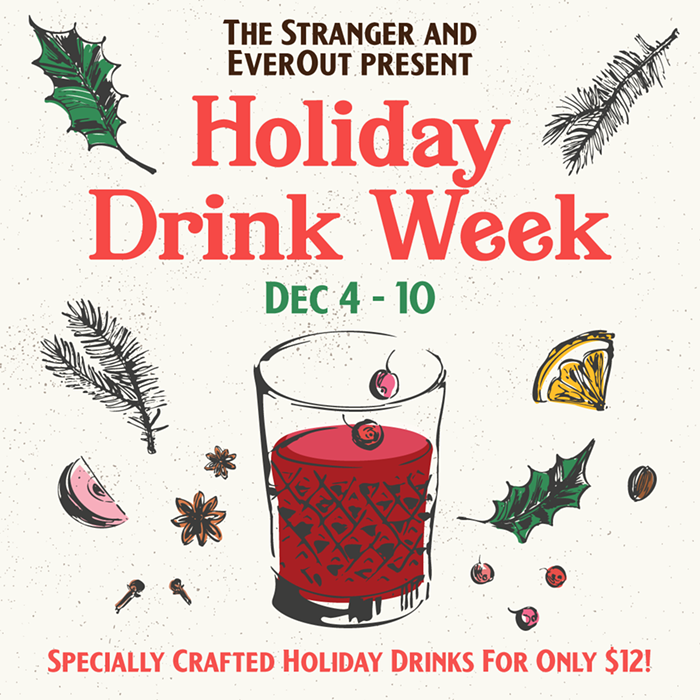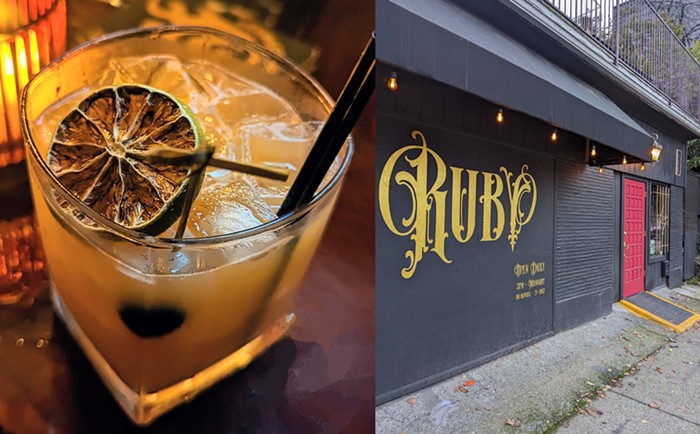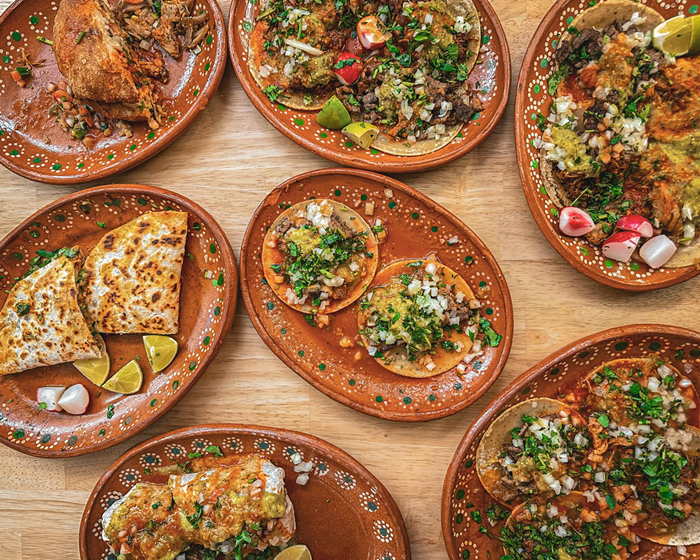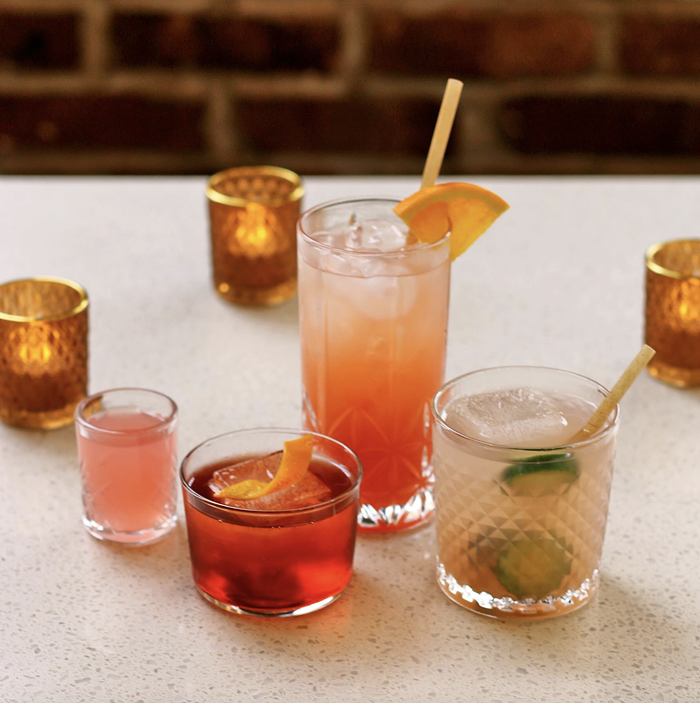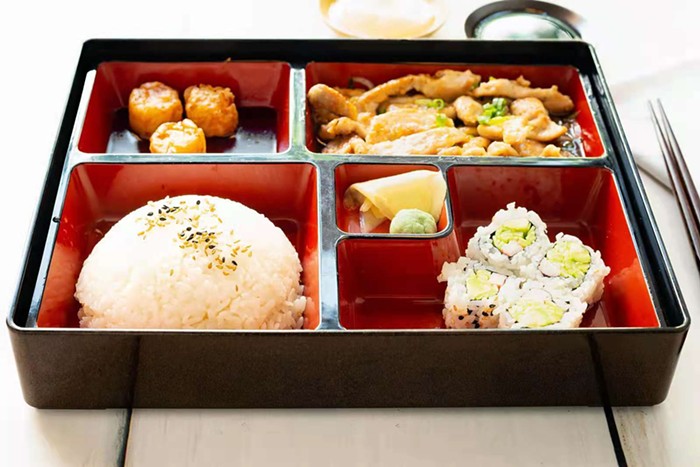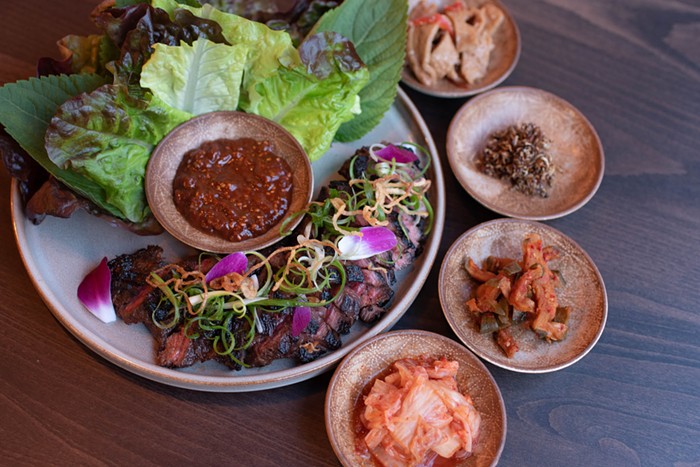"I don't like fake meat," says MacKenzie DeVito, owner of Ballard's No Bones Beach Club. "There's no point. We have all these beautiful vegetables and ingredients that can be made into solid, delicious food without trying to be something they're just not."
At No Bones, you won't find any soy-rizo, mock chicken, or portobello mushrooms doing their best impersonation of hamburger patties. Instead, you'll find tacos loaded with beer-battered and fried avocados, sandwiches stuffed with sesame-seed-crusted taro cakes, and poke (Seattle's current favorite dish) made not with raw fish but smoked golden beets. DeVito describes her menu as "Southern California–style food—fresh, with lots of vegetables, herbs, and great textures." After just a few bites, you'll be grateful that DeVito, who adopted a vegan diet seven years ago, has spent all her time since developing such flavorful, satisfying, and surprising food.
If you think of vegan food as being both virtuous and joyless, order a platter of No Bones' cauliflower wings in coconut buffalo sauce ($9), which also comes with a gratuitous side of creamy ranch dressing. Traditional buffalo sauces are a mix of a cayenne, vinegar, and lots of butter. Here, the sauce is as tangy and spicy as you would want, but DeVito masterfully substitutes in coconut cream "for that extra butter punch." While thick coconut milk would have sufficed, the use of its cream (picture the dense cloud of cream that settles on the top of a can of coconut milk) gives the sauce a next-level richness. The herby ranch dressing, made from soy-free Vegenaise and flecked with plenty of dill, provides a cooling counterpoint.
But it's not just the sauces that stand out: Big, meaty cauliflower florets are coated with a golden brown batter that's wonderfully crackly, shattering into bits that land on your plate with every bite. The batter provides another way for flavor to penetrate the food—it's slightly spiced, reminiscent of an Indian pakora, adding another dimension to the dish.
"I've spent the last seven years cooking, experimenting, and mastering what I do—mainly because I love to eat," DeVito says. But as a restaurant industry veteran and someone who grew up enjoying meat and dairy, it's clear she also sees it as a creative challenge.
A spirited inventiveness marks No Bones' eggplant fries ($9). Wedges of eggplant the size of dill pickle spears come rolled in a thick coating of panko crumbs (made with rice instead of wheat flour—much of the No Bones menu is also gluten-free) and black sesame seeds. They arrive standing in a basket, big and imposing like giant's fingers. While the rice flour gives their exteriors a bit of unpleasant gumminess, it's fairly easy to overlook this when you bite into the creamy, steaming flesh of the eggplant inside.
While the coating on the fries contains enough spicy chili powder to make eating them plain a pleasure, you will want to dip each fry—repeatedly—into the accompanying creamy sauces. One is rust-colored and smoky with roasted poblano peppers and paprika, the other a luscious green herbaceous sauce dubbed "sun goddess." You'll taste plenty of basil, as well as mint and cilantro. Also, according to DeVito, "lots and lots of garlic."
Sauces also shine in the crispy stuffed poblano pepper ($13), specifically a creamy sauce made from cashews. The natural sweetness of the nuts is cut with nutritional yeast, which gives it a deep, savory umami flavor. It plays nicely off the other sauce on the plate—a bright cilantro crema. The pepper is roasted and stuffed with white beans and vegan cheese (one that's actually creamy, not sad and rubbery). It's then dipped into a light batter and deep-fried, giving it a crackly, airy outer shell. More crunchy texture is added with a scattering of fresh scallions and purple cabbage.
Jackfruit flautas ($11) also showcase layers of texture and flavor: silky, stringy fruit (rarely used outside of Southeast Asian cuisine), crispy fried tortillas, smoky roasted chilies, piquant tomatillo-and-avocado salsa, and finely diced fresh carrots. The crowning jewel is the chao cheese—rich, coconut-based, and flavored with fermented tofu called "chao" in Vietnamese—that's made by local company Field Roast. DeVito is quick to praise the stuff, which she says is one of many recently developed food products helping more diners eagerly accept vegan food.
"For me—and basically every single person I talk to—the feeling is 'I can't be vegan because I can't give up cheese,'" DeVito says. Carnivores eating at No Bones will feel less like they are giving something up and more like they are adding to and expanding their palates.
The food at No Bones can skew sweet, as with the hearts of palm and parsnip cakes ($11). They sit atop a bed of spinach leaves looking not unlike seared scallops, pale pink with crispy, blackened surfaces. But when you slice into them, they break open to reveal haystacks of finely shredded parsnips whose sugars aren't quite balanced out by the tangy hearts of palm with which they're mixed. A heavy-handed drizzle of syrupy mango gastrique pushes things into cloyingly sweet territory. It needs less of that sauce and more of the jalapeño tartar that it's also served with. But the dish still plays with your perceptions, delivering unexpected tastes and pleasures.
DeVito started her business, originally called No Bones About It, in 2014. It began as an outdoor tent and then grew into a food truck that built a loyal following through regular gigs at Ballard breweries such as Reuben's and Populuxe. A massive fire in 2015 totaled the truck and derailed business for a few months, but loyal customers eagerly welcomed No Bones back.
Last fall, DeVito, her husband, her father, and a crew of women (No Bones employs entirely women—"I didn't plan that, it just ended up that way," she says happily) began rebuilding the Ballard space as the No Bones Beach Club. They opened the doors in February and have enjoyed a steady stream of customers since.
No Bones is a tiki bar—there are fruity drinks, and the decor includes surfboards, thatched huts, and a television playing movies like Elvis Presley's Blue Hawaii. It's tropical, whimsical, and a little bit cheesy. DeVito says she simply wanted to create a "fun place where lots of people feel comfortable." Tiki is far from my cup of tea—its history is darker and more complicated than its lighthearted appearance. But DeVito and her staff have succeeded in creating a space that's fun, welcoming, and, most importantly, delicious. I'll happily come back just for the food.

